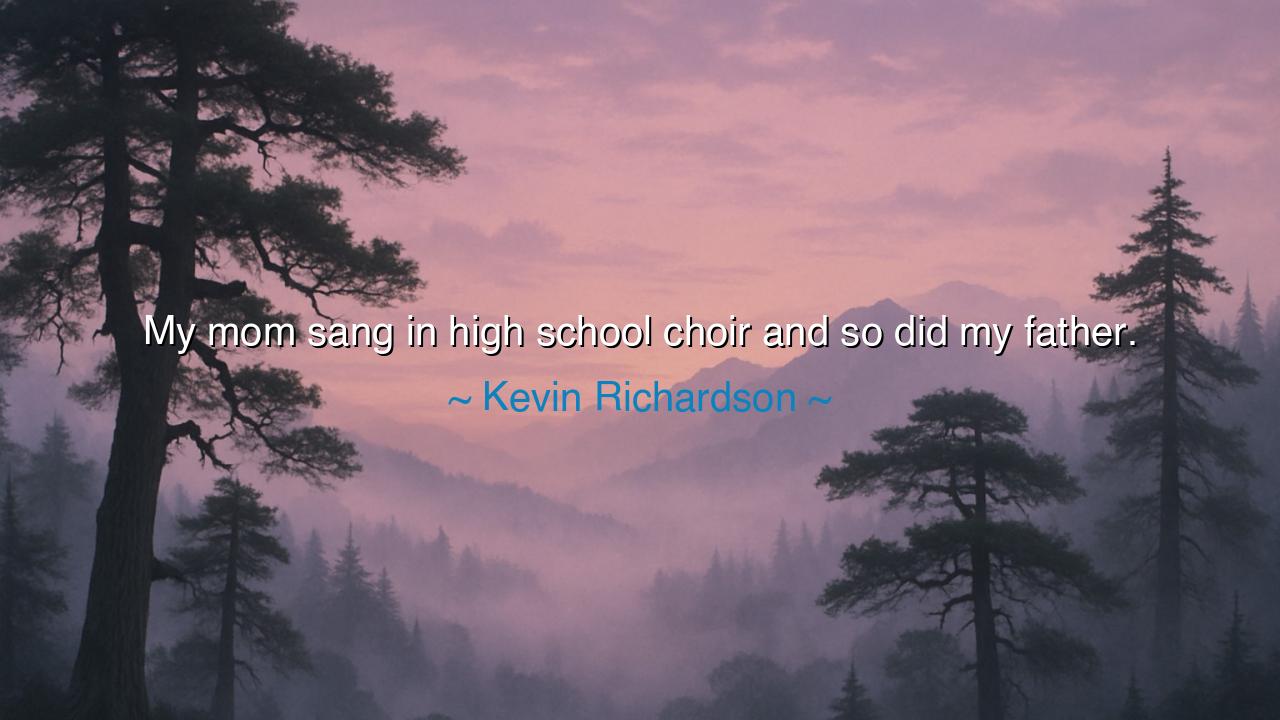
My mom sang in high school choir and so did my father.






When Kevin Richardson said, “My mom sang in high school choir and so did my father,” his words, though simple, carry the gentle weight of heritage — the transmission of art, spirit, and identity across generations. Beneath the modest phrasing lies a story as old as humanity itself: the way our gifts, passions, and callings are often born not in isolation, but from the echoes of those who came before us. In his remembrance of his parents’ voices, we hear more than nostalgia; we hear the ancestral melody of continuity, the way love of music, beauty, and harmony weaves its way through family lines like a sacred thread.
In the ancient sense, this quote speaks to inheritance of the soul, not of wealth or title, but of expression. The Greeks believed that the muses — goddesses of song, poetry, and inspiration — visited not randomly, but through lineage, blessing certain families to carry the flame of art from age to age. Richardson’s parents, singing in their youth, unknowingly prepared the soil for their son’s destiny. The choir they joined was more than a gathering of voices; it was a gathering of legacy. Their music did not end when the songs faded from the auditorium — it lingered, transforming into instinct, ready to awaken in the next generation.
In this, Kevin Richardson’s story becomes a parable of origin and purpose. For he would go on to become one of the voices of the Backstreet Boys, a group that shaped the soundscape of an era. Yet, the roots of that journey began not in fame, but in the humble halls of a high school choir — through two parents who sang because it brought them joy, because it connected them to something greater than themselves. Their art, unrecorded yet enduring, became the foundation upon which their son built his life. From their ordinary harmonies rose a legacy that would one day echo across the world.
History is filled with such lineages of talent and passion. Consider Johann Sebastian Bach, born into a family of musicians who, for generations, played in churches and courts throughout Germany. By the time he was born, music had already become the Bach family’s second language. Each ancestor, with their devotion and craft, had added a verse to a song that would culminate in Johann’s genius. Likewise, Richardson’s recollection reminds us that art is rarely a single note — it is a symphony passed from heart to heart, refined with each hand that carries it forward.
There is also in this quote a quiet reverence for the ordinary beginnings that shape extraordinary lives. The high school choir, often overlooked, becomes here a temple of formation — a place where discipline, harmony, and courage are born. In those rehearsals, his parents learned what it meant to listen, to blend, to create beauty in unity. It is perhaps because they once sang among many voices that their son learned how to harmonize not just in song, but in life. The choir, in this sense, becomes a metaphor for humanity itself — each person adding their part to the great music of existence.
The deeper meaning of Richardson’s reflection is not just about music, but about the unseen inheritance we all carry. Every person is, in some way, the living echo of their ancestors’ dreams, efforts, and passions. Whether through music, craftsmanship, kindness, or courage, something ancient lives within us — something we did not choose but were entrusted with. To honor that inheritance is to live consciously, to recognize that our gifts were not born in a vacuum, but nurtured by unseen hands, by voices long silent yet ever present.
And so, the lesson for future generations is clear: remember your roots, for they are the melody beneath your own song. Whatever your craft or calling, seek to understand where it began. If your parents planted seeds of art, knowledge, or virtue, let them bloom within you. If your ancestors’ voices were silenced, sing louder in their stead. For the truest tribute to those who came before is not imitation, but continuation — taking their humble beginnings and raising them toward new heights.
Thus, Kevin Richardson’s simple memory becomes an eternal truth: that our parents’ songs never truly end. They continue through us — through the choices we make, the beauty we create, and the love we give. Each of us, in our own way, is part of a family choir, carrying forward a note from the past into the vast music of the future. And when we remember this — when we honor the voices that shaped our own — we transform not only our lives, but the harmony of the world itself.






AAdministratorAdministrator
Welcome, honored guests. Please leave a comment, we will respond soon